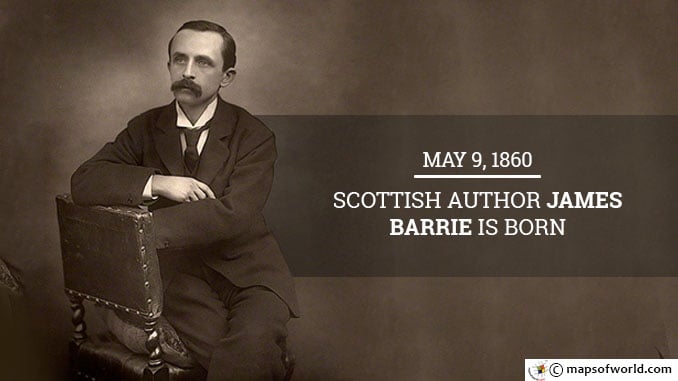Long before he wrote one of the most-loved children’s stories of all time, James Barrie was born in the tiny Scottish town of Kirriemuir on May 9, 1860. Though a highly-successful playwright and novelist after moving to London, he is remembered best as the creator of Peter Pan and, according to some, the man responsible for popularizing the name “Wendy.” The ninth of ten children, Barrie grew up the son of a weaver in his small hometown in eastern Scotland. His father, David, ran a stable weaving business and left much of the responsibility for raising the children to his wife, Margaret, who took great pains to ensure each of her children had a basic education. In order to stand out within the crowded household, Barrie engaged in one of his mother’s favorite pastimes: storytelling. The two frequently invented fantastic tales inspired by fiction of the era. From the age of 8, Barrie received formal schooling in a number of different academies, first in Glasgow under the tutelage of his older sisters, then back in Kirriemuir before joining his sisters again after they moved to Dumfries. Once there, now in his middle teens, Barrie’s imagination took off. He consumed every book he could, finding The Last of the Mohicans by James Fenimoore Cooper enthralling. Taking to the school grounds, he and friends conjured up thrilling adventures from the high seas, driving Barrie to form a drama club that gave him the opportunity to compose plays. Upon his graduation from Dumfries, Barrie found the appeal of life in the arts difficult to resist. In order to please his family, he found a way to apply his talents with the written word at the University of Edinburgh, studying literature instead of choosing the life in ministry his father had hoped for. Barrie worked hard, gaining some acclaim among his classmates for his piercing reviews of the local performing arts scene for the Edinburgh Evening Courant. His master’s degree complete at the age of 22, Barrie moved to Nottingham, England to work as a journalist. Dissatisfied with life in the English Midlands, the draw of pastoral Kirriemuir pulled him back to Scotland after just 18 months. Reunited with his mother, he sharpened his penchant for story, pulling together his first two books, Auld Licht Idylls and Better Dead, in 1888. (The former achieved some success, while the latter floundered.) He wrote an additional pair of novels over the next three years, yet most critics found his plots too simplistic and saccharine. By 1891, Barrie’s love for the theater became the focus of his energy. He partnered with H.B. Marriott Watson for an attempt at critical acclaim on the stage. Though the first effort fell flat, Ibsen’s Ghost (or Toole Up-to-Date) became a hit, running for more than two decades. Now well-regarded amongst the cultural elite in London, Barrie took to writing with renewed vigor. In quick succession, he produced the novel The Little White Bird and two more beloved plays, Quality Street and The Admirable Crichton, shortly after the turn of the 20th century. On December 27, 1904, Barrie’s work entered immortality — both literally and figuratively — with Peter Pan, or The Boy Who Wouldn’t Grow Up. The play is built around the relationship between Wendy and a fun-loving boy from Neverland with the ability to fly, shaped in many ways by his relationship with the family of Llewelyn Davis and the death of Barrie’s older brother. (According to Barrie, his mother took great comfort in knowing the deceased child would remain a boy forever.) An instant hit, suitable for parents and kids, not unlike modern animated films, George Bernard Shaw called it “a holiday entertainment for children but really a play for grown-up people.” The do-whatever-you-like morality of Neverland contrasted sharply with the attitudes of the period, perhaps giving those who attended a performance an escape. Amazed by the popularity of the stage show, Barrie wrote a novel Peter and Wendy in 1911 to capitalize on the public’s fascination. Already a wealthy man, Barrie spent much of the next quarter-century acting as producer with increasing frequency. Many of these plays flopped, but he continued to finance new ventures by writing fresh plays with characters far different than Peter Pan. For the most part, he chose to build his stories around adults grappling with somewhat taboo realities — a divorced woman learning to support herself, for instance. His last play, The Boy David, premiered just months before his death from pneumonia on June 19, 1937, at the age of 77. Buried in Kirriemuir beside his parents, Barrie’s name continues to appear on Peter Pan playbills all over the world, serving kids in more ways than one: the copyright for the play was bequeathed to Great Ormond Street Hospital, providing a living legacy to children with life-threatening illnesses for decades. Also On This Day: 1671 – Thomas Blood attempts to steal England’s Crown Jewels from the Tower of London. He is later pardoned. 1877 – Romania declares independence from the Ottoman Empire. 1873 – The crash of the Vienna stock market begins the Long Depression. 1950 – The Schuman Declaration, a proposal for a unified Europe by French diplomat Robert Schuman, is issued. 2001 – Fans at Accra Sports Stadium in Ghana break into a stampede, killing 129, after police fire tear gas into the crowd.
May 9 1860 – Scottish Author James Barrie is Born
Long before he wrote one of the most-loved children’s stories of all time, James Barrie was born in the tiny Scottish town of Kirriemuir on May 9, 1860. Though a…
248
